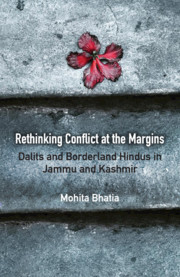Book contents
- Frontmatter
- Contents
- List of Figures and Tables
- Preface
- Acknowledgements
- 1 Introduction
- 2 Regional Diversities and the Conflict
- 3 Caste, Everyday Life and Conflict Politics
- 4 Border Realities: Contesting Hegemonic Paradigms of Nationalism and Conflict
- 5 Contesting the Homogenised Discourse of Religious Identities
- 6 Conclusion
- Glossary
- Bibliography
- Index
6 - Conclusion
Published online by Cambridge University Press: 30 April 2020
- Frontmatter
- Contents
- List of Figures and Tables
- Preface
- Acknowledgements
- 1 Introduction
- 2 Regional Diversities and the Conflict
- 3 Caste, Everyday Life and Conflict Politics
- 4 Border Realities: Contesting Hegemonic Paradigms of Nationalism and Conflict
- 5 Contesting the Homogenised Discourse of Religious Identities
- 6 Conclusion
- Glossary
- Bibliography
- Index
Summary
The research underlying this book was spurred by a gap in the existing scholarship on the ‘Kashmir conflict’ – a Kashmir Valley–centric view of the conflict. Conflict, here, is mainly understood as the resistance movement by Kashmiri Muslims against the Indian state. This scholarship, thus, obscures the stakes of diverse communities in other parts of the state such as Jammu and Ladakh that are also involved in the conflict in distinct ways. This book addresses this gap by centring the Jammu region and uncovering the socio-political perceptions of marginalised sections among Hindus on the ‘Kashmir conflict’. A dearth of academic study on these sections living in Jammu, either in relation to or independently of the conflict, thus, prompted this research. While explaining that the conflict extends to Jammu and shapes its politics, it has explored in detail what ‘conflict’ or conflict-based politics signifies to subordinate Hindu sections, mainly Scheduled Castes (SCs) and residents of border areas. It has also delved into their everyday lives and social spaces of resistance that may not be particularly related to the politics of conflict. This work, thus, constantly keeps moving in and out of the conflict debate to present a holistic and complex picture of the marginalised groups among Hindus of the state, their mundane struggles and their intricate involvement with the conflict-based politics. More broadly, this book has also looked at the cultural, religious and sub-regional diversity of Jammu, thus questioning the facile and simplistic notion of Jammu as a ‘Hindu’ region.
Why it is important to include Jammu into the academic purview? What significance does it have for understanding the conflict or perceptions of marginal Hindu communities or their quotidian social lives? This book has addressed these questions to argue that it is pertinent to analyse Jammu, which represents an important third dimension of the conflict, the other two being the international (India–Pakistan) and the domestic (Delhi–Kashmir) dimensions. One cannot comprehend the conflict in its entirety or the way it engages marginal Hindu sections without grasping the politics of Jammu.
Making a Case for Incorporating the Third Dimension
The logic of shifting Jammu from its position of marginality to the centre stage emanates from an understanding of the multi-layered nature of the conflict that extends from external (India–Pakistan) to internal (Delhi–Kashmir) to ‘intra-state’ levels.
- Type
- Chapter
- Information
- Rethinking Conflict at the MarginsDalits and Borderland Hindus in Jammu and Kashmir, pp. 160 - 182Publisher: Cambridge University PressPrint publication year: 2020



